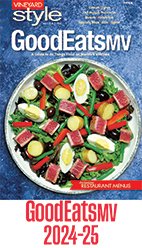ON ISLAND

The Serving Hands of Betty Burton
by Amelia Smith
Betty Burton talks about being temporarily able-bodied. She can see the vulnerability in all of our lives. An accident, an illness, or a job loss can send a person or a family into financial hardship, and it’s not a comfortable place to be. She volunteers, year-round, to help people who have fallen on hard times through a variety of food programs, including the Food Pantry and Serving Hands. Her work is driven by a sense of fairness and compassion. “You develop this empathy,” Betty says. “I’m very involved in making this easy for people. It’s hard to walk in that door. However people ended up at that door, it probably wasn’t because they did anything wrong.”
When Betty first moved to Martha’s Vineyard, she volunteered for Meals on Wheels, a service which delivers hot meals to elderly shut-ins. “I saw people malnourished, because there was no one there to properly care for them, each recipient needs special care and diets” she recalls. “If you can enter into their lives and make them feel alive and appreciated,” she says, “then that’s worth doing.” Her involvement with Meals on Wheels led to volunteering for the Food Pantry, which in turn led to becoming president of the Vineyard Committee on Hunger.
As president, one of her duties was to coordinate the federal surplus food program, now called Serving Hands Food Distribution. Since she began to supervise Serving Hands in 2000, she has seen the quality of food in the program improve dramatically. Where there used to be generic canned and dried foods, the Greater Boston Food Bank now sends brand-name products, fresh vegetables, meat, and eggs. Local businesses and individuals also contribute, especially around the holidays.
One Thanksgiving, the Food Bank only sent 20 turkeys to Serving Hands, and there were forty clients. “Who do you give it to?” Betty says. “Choose one family? I decided it would never happen again. I decided that we needed to do something different for Christmas that year.” She started a program called Family to Family, and in a few weeks had gathered enough donations to ensure that all the families who came to Serving Hands would get a holiday meal. Now, she plans these holiday meals well in advance, with help from the Pacheco family at Reliable Market, who help find the best price on turkeys and hams. Local farms, especially Morning Glory and Whippoorwill, donate vegetables through the Island Grown Gleaning program. Betty and her fellow volunteers put it all together in the Baptist Church’s parish hall, and distribute groceries there once a month.
When I walked into Serving Hands one Friday in March, a line of people circled all the way around the room. There were people from old Island families, recent immigrants, elderly women, young families, some who were seasonally unemployed and others with long-term disabilities. It was a snapshot of poverty on Martha’s Vineyard. Betty sat at a table, keeping the federally required records of how many people came through, their ages, family sizes, and income qualification. “Poverty has changed,” Betty says. “Recently, we’re seeing a lot more 50 to 60-year-olds that have lost their jobs in the recession, and who won’t be getting another anytime soon.”
In the summer, when more people have jobs and the food distribution isn’t as busy, Betty can help people fill out applications for food stamps, and direct them to other services. She continues to volunteer at the locally organized food pantry, open only in the “off” season. Her involvement there, in addition to her work at Serving Hands, helps her get to know this part of the community, what they need, and how best to help them.
“If you’re going to be poor, this probably isn’t such a bad place,” Betty says of Martha’s Vineyard. “I am so happy that our community is coming together to help others that are in need. We are all in this together. It brings us closer as a community when we work to help each other.”
When Betty first moved to Martha’s Vineyard, she volunteered for Meals on Wheels, a service which delivers hot meals to elderly shut-ins. “I saw people malnourished, because there was no one there to properly care for them, each recipient needs special care and diets” she recalls. “If you can enter into their lives and make them feel alive and appreciated,” she says, “then that’s worth doing.” Her involvement with Meals on Wheels led to volunteering for the Food Pantry, which in turn led to becoming president of the Vineyard Committee on Hunger.
As president, one of her duties was to coordinate the federal surplus food program, now called Serving Hands Food Distribution. Since she began to supervise Serving Hands in 2000, she has seen the quality of food in the program improve dramatically. Where there used to be generic canned and dried foods, the Greater Boston Food Bank now sends brand-name products, fresh vegetables, meat, and eggs. Local businesses and individuals also contribute, especially around the holidays.
One Thanksgiving, the Food Bank only sent 20 turkeys to Serving Hands, and there were forty clients. “Who do you give it to?” Betty says. “Choose one family? I decided it would never happen again. I decided that we needed to do something different for Christmas that year.” She started a program called Family to Family, and in a few weeks had gathered enough donations to ensure that all the families who came to Serving Hands would get a holiday meal. Now, she plans these holiday meals well in advance, with help from the Pacheco family at Reliable Market, who help find the best price on turkeys and hams. Local farms, especially Morning Glory and Whippoorwill, donate vegetables through the Island Grown Gleaning program. Betty and her fellow volunteers put it all together in the Baptist Church’s parish hall, and distribute groceries there once a month.
When I walked into Serving Hands one Friday in March, a line of people circled all the way around the room. There were people from old Island families, recent immigrants, elderly women, young families, some who were seasonally unemployed and others with long-term disabilities. It was a snapshot of poverty on Martha’s Vineyard. Betty sat at a table, keeping the federally required records of how many people came through, their ages, family sizes, and income qualification. “Poverty has changed,” Betty says. “Recently, we’re seeing a lot more 50 to 60-year-olds that have lost their jobs in the recession, and who won’t be getting another anytime soon.”
In the summer, when more people have jobs and the food distribution isn’t as busy, Betty can help people fill out applications for food stamps, and direct them to other services. She continues to volunteer at the locally organized food pantry, open only in the “off” season. Her involvement there, in addition to her work at Serving Hands, helps her get to know this part of the community, what they need, and how best to help them.
“If you’re going to be poor, this probably isn’t such a bad place,” Betty says of Martha’s Vineyard. “I am so happy that our community is coming together to help others that are in need. We are all in this together. It brings us closer as a community when we work to help each other.”








